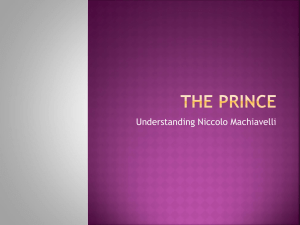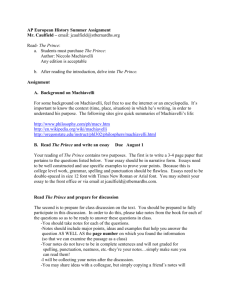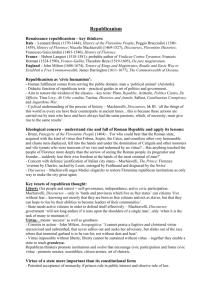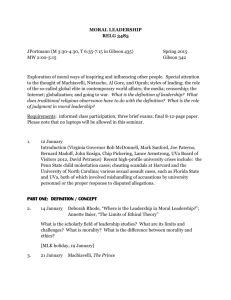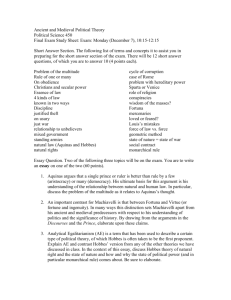PS 931: Reading Machiavelli (Fall 2011) - UW
advertisement
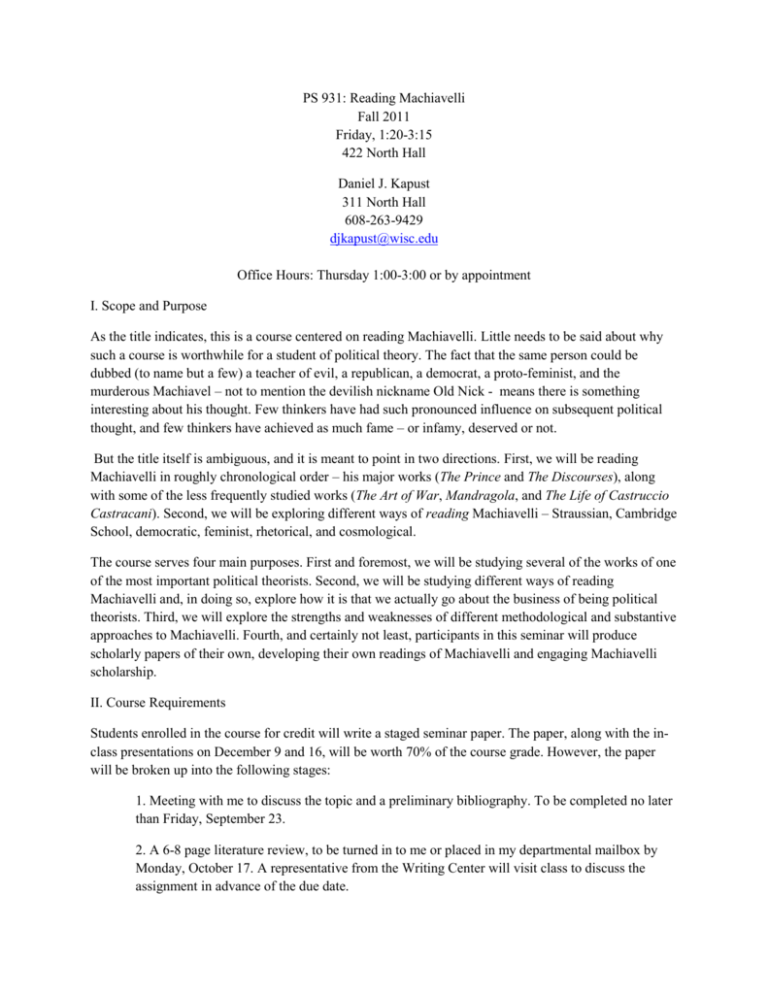
PS 931: Reading Machiavelli Fall 2011 Friday, 1:20-3:15 422 North Hall Daniel J. Kapust 311 North Hall 608-263-9429 djkapust@wisc.edu Office Hours: Thursday 1:00-3:00 or by appointment I. Scope and Purpose As the title indicates, this is a course centered on reading Machiavelli. Little needs to be said about why such a course is worthwhile for a student of political theory. The fact that the same person could be dubbed (to name but a few) a teacher of evil, a republican, a democrat, a proto-feminist, and the murderous Machiavel – not to mention the devilish nickname Old Nick - means there is something interesting about his thought. Few thinkers have had such pronounced influence on subsequent political thought, and few thinkers have achieved as much fame – or infamy, deserved or not. But the title itself is ambiguous, and it is meant to point in two directions. First, we will be reading Machiavelli in roughly chronological order – his major works (The Prince and The Discourses), along with some of the less frequently studied works (The Art of War, Mandragola, and The Life of Castruccio Castracani). Second, we will be exploring different ways of reading Machiavelli – Straussian, Cambridge School, democratic, feminist, rhetorical, and cosmological. The course serves four main purposes. First and foremost, we will be studying several of the works of one of the most important political theorists. Second, we will be studying different ways of reading Machiavelli and, in doing so, explore how it is that we actually go about the business of being political theorists. Third, we will explore the strengths and weaknesses of different methodological and substantive approaches to Machiavelli. Fourth, and certainly not least, participants in this seminar will produce scholarly papers of their own, developing their own readings of Machiavelli and engaging Machiavelli scholarship. II. Course Requirements Students enrolled in the course for credit will write a staged seminar paper. The paper, along with the inclass presentations on December 9 and 16, will be worth 70% of the course grade. However, the paper will be broken up into the following stages: 1. Meeting with me to discuss the topic and a preliminary bibliography. To be completed no later than Friday, September 23. 2. A 6-8 page literature review, to be turned in to me or placed in my departmental mailbox by Monday, October 17. A representative from the Writing Center will visit class to discuss the assignment in advance of the due date. 3. A detailed outline of the paper (3-5 pages), to be turned in to me or placed in my departmental mailbox on or before Friday, November 11. 4. The final seminar paper (20-30 pages), to be turned in to me or placed in my departmental mailbox no later than Wednesday, December 7. You will receive a grade for the paper as a whole, and not for the individual components, each of which is designed to help you produce a stronger paper. In order to receive credit for the paper, however, you need to complete each of the components. The last two days of the course will be reserved for presentations of seminar papers. You should view this as, in essence, a practice conference presentation, and will be allotted 15 minutes to present your paper, after which I will offer approximately 5 minutes of comments. We will then have 15 to 20 minutes of class discussion of the papers. The goal of this exercise is both to familiarize you with the basics of presenting at conferences, to provide further feedback on your papers, and to further enrich the mutual learning experience of the seminar by incorporating peer feedback. In addition to the seminar paper and presentation, participation will be worth 30% of the course grade. This involves closely and carefully reading the assigned material, and participating in seminar discussion. It also requires each participant to lead discussion once during the semester. This will involve identifying an argument or passage from the day’s reading that you find to be theoretically significant, interesting, or provocative, discussing the passage and its relationship to the broader arguments or themes of the day’s reading for roughly minutes, and then presenting three issues for discussion centered on that day’s reading. Auditors will be expected to do all the readings and to lead one discussion during the semester. III. Incompletes and Academic Dishonesty Incompletes for this course will only be granted under extraordinary circumstances. Academic dishonesty will not be tolerated, and will be subject to severe penalties. IV. Texts Five texts are required for this course, and are available for purchase at the University Book Store. Maria J. Falco, Feminist Interpretations of Machiavelli Allan Gilbert, Machiavelli: The Chief Works and Others, Volumes 1 and 2 John P. McCormick, Machiavellian Democracy Cary Nederman, Machiavelli All other readings (marked with an asterisk) will be available for photocopying and placed on top of the small cabinet with glass doors in the Graduate Reading Room on the 3rd floor of North Hall. I have ordered and recommended that you purchase Al Martinich’s Philosophical Writing. While it will be very useful for you to work through the book, it is not required. V. Schedule of Readings and Discussions Friday, September 2: Course Introduction; Isaiah Berlin, “The Originality of Machiavelli” Required reading: Isaiah Berlin, “The Originality of Machiavelli”* Friday, September 9: The Prince Required reading: The Prince Friday, September 16: Discourses Required reading: Discourses, Books I and II PLEASE NOTE: We will begin class on September 16 at 2:00. Friday, September 23: Discourses Required reading: Discourses, Book II, cont’d; Book III Friday, September 30: The Art of War Required reading: The Art of War Friday, October 7: Minor Works Required Reading: Mandragola; The Life of Castruccio Castracani Friday, October 14: No class due to APT conference Friday, October 21: Machiavelli: Modern and/or Immoralist Required reading: Leo Strauss, “What is Political Philosophy?”* Leo Strauss, “Machiavelli”* Harvey Mansfield, “Machiavelli’s Virtue”* Paul A. Rahe, “Situating Machiavelli”* Suggested readings: Leo Strauss, Thoughts on Machiavelli Harvey Mansfield, New Modes and Orders W.R. Newell, “How Original is Machiavelli?” Political Theory, 15.4, 1987 Friday, October 28: The Cambridge School and Republicanism Required reading: Quentin Skinner, “Meaning and Understanding in the History of Ideas”* Quentin Skinner, “Machiavelli on Virtù and the Maintenance of Liberty”* Quentin Skinner, “The Republican Ideal of Political Liberty”* Quentin Skinner, “Machiavelli’s Discorsi and the Pre-Humanist Origins of Republican Ideas” Suggested readings: J.G.A. Pocock, The Machiavellian Moment Quentin Skinner, The Foundations of Modern Political Thought, Volume 1 Friday, November 4: Democratic Readings of Machiavelli Required reading: John P. McCormick, Machiavellian Democracy PLEASE NOTE: Professor McCormick will be visiting Madison that Friday for the Political Theory Workshop, and has kindly agreed to visit our seminar to discuss his book. Friday, November 11: Feminist Readings of Machiavelli Required readings: Machiavelli, Clizia Selected chapters from Feminist Interpretations of Machiavelli (TBA) Suggested reading: Hanna Pitkin, Fortune is a Woman Friday, November 18: Rhetorical Readings of Machiavelli Required readings: Maurizio Viroli, Machiavelli (Chapter 3)* Virginia Cox, “Machiavelli and the Rhetorica ad Herennium”* Daniel J. Kapust, “Acting the Princely Style”* Eugene Garver, “Machiavelli’s Prince: A Neglected Rhetorical Classic”* Suggested readings: Garrett Mattingly, “The Prince: Political Science or Political Satire?” The American Scholar, 27, 1958 Mary Dietz, “Trapping the Prince” American Political Science Review, 80.3, 1986 Victoria Kahn, Rhetoric, Prudence, and Skepticism in the Renaissance Friday, December 2: Machiavelli and the Cosmos Required reading: Cary Nederman, Machiavelli Suggested readings: Anthony J. Parel, The Machiavellian Cosmos Sebastian de Grazia, Machiavelli in Hell Friday, December 9: Seminar Paper Presentations Friday, December 16: Seminar Paper Presentations

